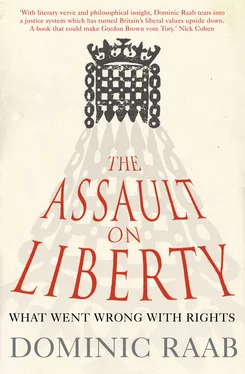The Assault on Liberty
Dominic Raab
What Went Wrong with Rights

For Erika
Cover Page
Title Page The Assault on Liberty Dominic Raab What Went Wrong with Rights
Dedication For Erika
FOREWORD
INTRODUCTION
PART I WHERE DID RIGHTS COME FROM?
1 Runnymede
PART II WHERE DID RIGHTS GO?
2 Security versus Liberty
3 Short-circuiting the Justice System
4 Surveillance Society
PART III THE WRONG KIND OF RIGHT
5 Rights Contagion
6 The Risks of Rights
PART IV PUTTING IT RIGHT
7 The Next Chapter of British Liberty
CONCLUSION
NOTES
INDEX
ACKNOWLEDGEMENTS
About the Author
Copyright
About the Publisher
Liberty matters. That statement may seem self-evident, but the freedom under the law that we have historically enjoyed in Britain is more fundamental to the entire nature of our society than many realize.
Freedom is a pervasive virtue, and it has a material impact on many aspects of our national history. Freedom of speech has encouraged freedom of thought, and that is the bedrock of our extraordinary creativity over the centuries – whether it is in literature, or science, or political philosophy for that matter. In conjunction with the freedom of action available to British citizens, buttressed by property rights, it engendered the industrial revolution and made us one of the richest and most powerful nations in the world.
As a rich and powerful nation, our political ideas – foremost amongst them freedom under the law – have been disproportionately disseminated around the world. Those countries that embraced those ideas – from America to Australia to India – are amongst the most successful and civilized nations both today and in the future.
So it is a particular tragedy that we in Britain are slowly abandoning the very characteristics that have made us and others so successful and civilized. It is also ironic that we are doing so often in response to a threat from people that have no respect for those values – who despise tolerance, liberty, and diversity.
The last decade has witnessed an accelerating erosion of liberty on many fronts, all carefully documented in this timely book. The attack on the fundamental liberties, such as habeas corpus, is at the front of the public mind because of the pitched parliamentary battles on ninety days and more recently forty-two days detention without charge.
But these assaults are only the most visible part of the attack. Equally pernicious are the massive intrusions on our privacy with the growth of the huge government databases and the identity card register, the pernicious growth of a surveillance state with cameras seemingly on every corner, the creation of a ‘suspect society’ with the recording of the DNA of a vast number of innocent people, all in conjunction with the undermining of the institutional structures that have historically protected us from excessive state power, most notably jury trials.
Each and every one of these actions has a sensible idea at the core, but one which has been massively overused to the point where it ceases to be a challenge to the guilty and becomes a threat to the innocent.
Why does this happen? What has happened in government to create this soft tyranny in Britain?
Is it that our New Labour masters have decided to covertly put in place the pieces of a dictator state? Hardly, although one or two of their Home Secretaries may have had unhealthy instincts in that direction. Most British politicians are broadly altruistic, and would be horrified to be seen to be the instruments of such action.
No, the problem is more systemic than that, and as a result this is a book that should be read as a cautionary warning by would-be ministers of any political colour, and by those who want to keep an eye on them, be they elector or commentator.
The first of the culprits is the concept of the ‘continuous campaign’. This idea, imported from Bill Clinton’s America, is that political parties should not stop campaigning once they are elected, but should carry on as though they are still in mid election whilst they are in government. Although this sounds mundane, it is at odds with the real behaviour of most British governments down the decades. Most of them just thought about the campaign in the last year before an election, and up until then just ran the country in the interests of the electorate.
The danger of the continuous campaign is that it encourages ministers to use the apparatus of the state to promote the cause of one party or even one minister. The first effect of this is to make everything much more short term. Favourable headlines take the place of favourable outcomes as primary objectives to be achieved. This trend is reinforced by the twenty-four-hour media’s hunger for news.
Add this to a set of policy problems that are relatively intractable, such as Islamist terrorism, or persistent rising crime, and the tendency is to go for more and more tough and dramatic sounding headlines – and therefore for ever more draconian policies. This tendency is reinforced when politicians sell a simplistic analysis of the problem to a worried public. It is reinforced even more when the politicians overdramatize the risks.
So we end up with vast numbers of security cameras that are largely useless for crime prevention or detection, and for which there are precious few privacy protections – but the minister got his ‘10,000 new cameras’ headline. We end up with huge databases that carry vast amounts of acutely personal information on us all, and which put our privacy and even security at risk – but the minister gets his ‘High tech Health Service’ headline.
Of course history catches up. Now the papers are full of stories of lost personal details, and we see everything from bank account details to soldiers’ lives put at risk. We see stories of so-called security cameras used to spy on young women, or on a more mundane level used to maximize council revenues rather than minimize personal risks.
We can be sure that there will be much more to come. The government has begun to make a habit of trying to short circuit legal process, by curbing jury trials, cutting back the powers of magistrates courts, and replacing some court appearances with summary justice in the form of fines and cautions. The effect will make the figures for clear up of crime look good, but it will achieve the interesting double of under-punishing the guilty whilst risking destroying an innocent person’s life with a miscarriage of justice. This, and some of the other effects of the erosion of our freedoms and protection under the law, will take years to surface in the public mind. But surface it will, and when it does the British people will not be impressed.
The other assault on our freedoms comes from a complex nexus of actions whose aim, paradoxically, is to improve our rights. The growth of a rights culture, with an inflation of what fundamental rights really are, in conjunction with well-intentioned but flawed approaches like some of the decisions of the Strasbourg Court and some of the British courts under the Human Rights Act, has led to a peculiar dilution of British freedoms and a signal failure to defend some of those freedoms when they came under serious threat.
The irony here is that the vested interests that defend these flawed institutions are often those that fight a sterling battle in defence of our freedoms in other contexts. The argument is therefore harder to make, but no less important for all that.
Читать дальше













